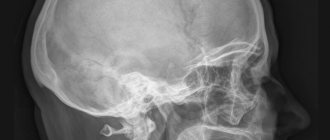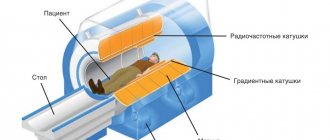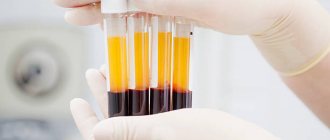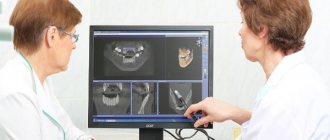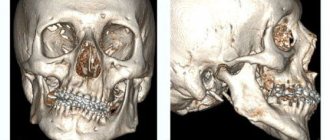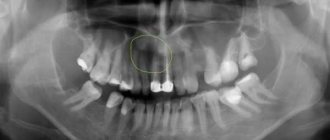The main task of an ultrasound doctor is to conduct diagnostic studies using special equipment using ultrasonic waves. In addition, this specialist gives recommendations on undergoing additional examinations using other methods (laboratory tests, instrumental diagnostics, etc.). If necessary, doctors of other specialties are involved for consultation and treatment.
Specifics of the profession
The use of ultrasound diagnostics greatly simplifies the diagnosis. Using the machine, the ultrasound doctor will quickly obtain secret data that is hidden in the depths of the body, giving the person a chance for recovery. A doctor who examines internal organs using ultrasound waves must have a good knowledge of anatomy, physiology, and have skills in recognizing benign and malignant formations and inflammatory processes.
Today, the profession of a doctor specializing in ultrasound is in demand in local and private clinics. A specialist who can competently describe the state of the body seen on the monitor screen will bring enormous benefits to a person.
Like every medical professional, an ultrasound doctor has a job description. His main functional responsibility is to conduct and evaluate diagnostic results using an ultrasound machine.
The deeper the specialist’s knowledge, the better the examination will be carried out: it is not enough to see, you need to understand what you see. The reliability of the results of an ultrasound examination very much depends on the knowledge and experience of the specialist who interprets them.
The ultrasound doctor is constantly developing and improving his skills. Firstly, he needs to be well versed in the operation of the device, have an understanding of the impact of ultrasound on the internal organs of a person and master the examination technique.
Secondly, to decipher the data, the doctor must know the name and location of each organ, and have information regarding:
- topography of organs;
- features of anatomy and morphology;
- standards and norms for the size of the organs being studied;
- possible complications, diseases, neoplasms.
Who is an ultrasound diagnostic doctor and what does he do?
Many inquisitive people are interested in which doctor does ultrasound, keeping in mind the doctor’s specialization. Usually in medical institutions such a professional is called an ultrasound specialist. If the institution is specialized, then most often the ultrasound examination is performed by a specialized doctor. For example, in cardiovascular hospitals, ultrasound is performed by a vascular surgeon. In regular clinics, this is most likely a general practitioner.
The quality of the ultrasound result depends on the doctor’s experience and equipment. If the device is more functional, then you can expect better results from it. Not all small provincial hospitals have an ultrasound machine. Usually it is one for several institutions. A doctor of any specialization who has undergone additional training works on it. To make an accurate diagnosis, an ultrasound specialist examines many systems and organs. With some experience, he can take biopsies under ultrasound guidance. This is very important for various neoplasms. An ultrasound doctor performs pregnancy screening, which helps determine the following parameters:
- gestational age;
- condition of the placenta;
- position of the baby in the uterus;
- fetal development;
- estimated time of birth.
The ultrasound doctor performs diagnostics, but does not provide treatment. You can contact such a specialist on your own or under the direction of your treating doctor.
The ultrasound doctor will confirm the diagnosis or be able to make it himself for such pathologies as:
- gastrointestinal diseases;
- thyroid lesions;
- ailments of the male sphere;
- diseases of the female genital organs and much more.
The patient should prepare for the ultrasound examination. If an abdominal examination is to be performed, then a number of foods should not be taken for 2 days. These are vegetables and fruits, legumes, carbonated drinks, black bread and everything that causes excessive gas formation. It is advisable to drink activated carbon. You can eat food before the ultrasound 20 hours before, no later. On the day of the study, you should not drink, brush your teeth, rinse your mouth, or take medications in the morning. If the doctor recommends something else, then you should listen to it.
When examining the organs of the genitourinary system, it is necessary to come to the procedure with a full bladder. To do this, you should drink a certain amount of liquid and not visit the toilet for 4 hours.
What are the responsibilities of an ultrasound specialist?
Each employee must comply with the job description, safety and labor protection instructions. The workplace must be orderly and clean. The device undergoes periodic testing, and verification documents are stored in an accessible place.
Responsibilities of a specialist working with an ultrasound machine: strictly follow all instructions and maintain documentation. After working with the device, at the end of the working day, you need to draw up a report on the work done, fill out logs and forms.
Doctor's work algorithm
The doctor can work with a nurse or alone. If there is no nurse in the office, the doctor independently prepares the office and equipment for work. He must:
- Connect the device to the network.
- Check its serviceability in test mode.
- Prepare gel and gloves.
- Conduct an examination and prepare a description of the condition of the organs being examined.
- The doctor registers each visitor in a journal and gives him a research report.
Are there any contraindications for ultrasound?
In most cases, there are no serious contraindications that prevent the doctor from using ultrasound for diagnosis. This is a harmless technique that can even be used to study the condition of the internal organs of pregnant women and young children. But there are a number of relative contraindications, including, for example:
- skin diseases that do not allow contact of ultrasonic sensors with the patient’s body;
- obesity – it impairs data visualization and makes ultrasound less informative;
- urinary incontinence - it is not recommended to use ultrasound if it is necessary to examine the bladder.
Where can an ultrasound specialist work?
The profession is in demand both in large cities and in the outback. This is due to the low cost, safety and widespread use of the ultrasound method.
An ultrasound diagnostic doctor can work within the walls of a clinic, private clinics, medical centers, and hospitals. The main thing is not in which hospital a person performs an ultrasound, but on what device and who performs this procedure on him. Therefore, experienced specialists can always find a good place to work.
Doctors of the highest categories are admitted to scientific and practical centers in regional cities. You can get an appointment with them by appointment. In order not to waste time waiting, many are willing to pay for the work of such specialists in a private clinic, where they conduct appointments in their free time from the main government practice. This confirms the prestige of the profession.
Which organs can ultrasound check?
All internal organs are examined using ultrasound. Thanks to the diagnostic work of a specialist, the condition is examined:
- abdominal organs;
- hearts;
- mammary glands;
- thyroid gland;
- salivary glands;
- fallopian tubes and fetus;
- large and small intestines;
- blood vessels;
- lymph nodes;
- skulls;
- joints;
- ovaries, scrotum;
- kidneys and other organs.
Many children's congenital or acquired pathologies were cured with the help of timely diagnosis using ultrasound waves.
Having received the results of the study, the specialist enters them into a special form. In it, he necessarily notes the real condition of the tested organ, the norm for it and the identified deviations. Having received the research protocol in hand, the patient goes to the attending physician, who prescribes further examination, tests, and determines the treatment regimen.
When is dental prosthetics needed? Who does this and what is the essence of the process?
Dental prosthetics is a procedure aimed at restoring the integrity of the dentition, eliminating tooth damage, and correcting aesthetic defects.
Who inserts dentures?
The absence of one or more teeth is not only a cosmetic defect. Violation of the structure of the dentition leads to deformation of the bite and the entire maxillofacial complex as a whole.
Poor quality chewing of food negatively affects the functioning of the digestive system and gastrointestinal tract.
The restoration and replacement of lost teeth, as well as the restoration of damaged dental tissues, is carried out by a doctor qualified as an orthopedic dentist. Sometimes specialists in this area of dentistry are called prosthetists.
Important : many people believe that an orthopedist and an orthodontist are doctors of the same specialty. This is wrong. An orthopedic doctor produces various types of prosthetics, while an orthodontist deals with problems of bite correction, installation of braces and orthodontic plates.
What should an orthopedic dentist do?
The range of responsibilities of an orthopedic doctor is quite wide.:
- Carrying out diagnostics. This is usually an orthopantogram, an x-ray examination of the jaw.
An X-ray allows a specialist to identify cavities and other damage to teeth that are invisible to the naked eye, as well as determine the condition of their roots. In some cases, to obtain a three-dimensional image, a computed tomography scan is prescribed. This diagnostic method is usually used when internal hematomas and tumors are suspected. It also makes it possible to more accurately assess the condition of bone tissue. - Choice of prosthetic tactics. Modern dentistry has a fairly wide range of methods, orthopedic structures and materials.
In dental orthopedics, two main types of prosthetic products are classified - removable and fixed dentures. Implants are non-removable structures. crowns, inlays, bridges, as well as microprostheses - veneers and lumineers. Removable dentures are divided into: complete (false jaws) used in the complete absence of teeth, partial dentures are used when supporting segments are preserved, and so-called “butterflies” or immediate dentures when replacement of 1-2 dental units is required. - Preparing the patient's oral cavity for prosthetics. It includes sanitation, removal of carious tissues and tartar, and, if necessary, pulp removal. Also, grinding of supporting teeth for subsequent fastening of crowns and other orthopedic structures to them.
- Carrying out prosthetics in accordance with the chosen tactics. The most important stage of prosthetics is taking impressions using plaster or other materials to create an individual model of the prosthetic product. Modern technologies make it possible to perform virtual three-dimensional modeling.
Based on the model created according to the anatomical parameters of the given patient, the necessary orthopedic structures are manufactured in the dental workshop.
After fitting and, if necessary, correction, dentures are installed in the oral cavity.
- Removal of prosthetic products if there is a need for their restoration or treatment of the teeth on which they are attached.
In what cases is it necessary to consult a doctor?
There are many reasons to visit a prosthetist. The most common of these is the absence of one or more dental units.
A person can lose teeth due to various reasons. These include traumatic injuries, untreated oral diseases such as caries, periodontal disease, pulpitis and others. Teeth are also destroyed due to the innate structural features of the enamel.
Modern technologies make it possible to restore chewing functions , as well as restore aesthetic appeal even if the patient has no teeth at all. It is also worth visiting an orthopedic dentist in the case when the tooth is preserved, but its crown part is damaged or partially destroyed.
Pathological abrasion of teeth due to the structural features of tooth enamel is successfully eliminated through prosthetics. A prosthetist dentist will help restore the aesthetics and attractiveness of your smile when it comes to front teeth (darkening of the enamel, chips and other cosmetic problems).
What is the name of the doctor who makes crowns?
The crown is one of the most popular orthopedic structures in dentistry.
The installation of crowns in the oral cavity is performed by a prosthetist dentist. The direct production of prosthetic products is carried out by specialists from the dental laboratory.
How are dentures installed?
First, let's look at what a dental crown is and what it serves. The crown is a non-removable orthopedic structure. According to their functional purpose, crowns come in several types :
- supporting;
- restorative;
- implantological;
- aesthetic.
There are different designs of prostheses.:
- full;
- pin;
- partial (half-crowns).
Dental crowns are made from various materials: metal alloys, composite materials, porcelain, ceramics, as well as combined structures.
Prosthetics with crowns are used in the following cases:
- Destruction of more than 50% of the hard tissues of the tooth. In this case, the crown is placed on the tooth, preventing its further destruction. The architecture and functionality of the tooth is also restored.
- To fill the missing units of the dental row, bridges are used, which are several crowns welded together. The supporting elements for bridges are adjacent teeth or, in their absence, pins implanted into the bone tissue of the jaw.
- Changes in size, shape and color of teeth.
- With an abnormal arrangement and size of elements of the dentition.
Installation of a dental crown occurs in several stages.
The most important step in preparing for any type of prosthetics is sanitation of the oral cavity. It includes treatment of inflammatory processes, removal of carious tissues to avoid the occurrence of secondary caries, depulpation and filling of the canals of damaged teeth. Another mandatory procedure is the removal of tartar and plaque, especially in the root zone of the tooth.
Preparation of the oral cavity can take several months and is a necessary condition for successful and high-quality prosthetics.
When the preparatory stage is completed, the orthopedic specialist selects the prosthetic tactics necessary in a particular case. The type of prosthetic structure and the base material for its manufacture are selected individually.
Important : dental clinics at various levels have a wide variety of materials for prosthetics.
The choice of material for making crowns depends on several factors: functionality, expected load, aesthetic properties and, importantly, the cost of the product.
Next, modeling of future crowns is performed. and plaster casts of the dentition are made In some clinics, computer three-dimensional modeling is available, followed by printing the model on a 3D printer.
Based on the completed model, an orthopedic structure is manufactured in a dental laboratory.
Preparing the dental arch for prosthetics involves grinding the supporting teeth or installing pins on which the prosthesis will be attached.
In the process of making crowns, several fittings are made , and, if necessary, correction.
The final stage is the final fitting and installation of crowns in the oral cavity. Fixed dentures are fixed using dental cement.
Crown care
Artificial teeth are not subject to carious processes, however, the plaque that forms on their surface as well as in the interdental space is a breeding ground for pathogenic microorganisms. This leads to the appearance of bad breath and the development of inflammatory processes in the oral cavity.
Caring for fixed dentures involves regular daily oral hygiene, thorough cleaning of teeth and interdental spaces. It is necessary to brush your teeth in the morning and in the evening .
Important : plaque that accumulates in the root zone eventually turns into tartar, which negatively affects the health of the gums and also shortens the life of dentures.
For more complete cleaning, experts recommend using dental floss and special brushes. It would also be a good idea to use rinse aids.
When caring for ceramic and porcelain crowns, soft toothbrushes and gentle toothpastes are used. The dentist will help you choose the right care products depending on the type of crowns and the material from which they are made.
After prosthetics, preventive examinations by the dentist should be performed at least once every six months.
Compliance with these simple rules will help maintain the health of the oral cavity and significantly extend the life of the orthopedic prosthetic structure.
Thanks to the variety of prosthetic methods, prosthetic designs and materials for their manufacture, everyone can choose an option that is acceptable to them and thereby preserve their health, the beauty of their smile and self-confidence for many years.
Who makes the final diagnosis?
The professional standard of the ultrasound physician does not allow him to make a diagnosis or issue a final conclusion. The ultrasound doctor’s task is to describe the course of the disease and conduct a high-quality diagnosis of organs. For example, if the attending physician gives a referral for an ultrasound scan of the adrenal glands, the diagnostician must analyze the size, structure, presence or absence of tumors or foreign substances. The professional standard does not allow making a diagnosis, offering treatment, or making prognoses. Violation of this rule may result in the doctor in the diagnostic room losing his license to work.
The maximum effectiveness of diagnostics using ultrasound examination has been noted for heart defects, disorders of the circulatory system, cystitis, appendicitis, cholelithiasis, cholecystitis, and pregnancy.
What kind of doctor does an ECG in a clinic?
When making an appointment with a doctor, we expect qualified assistance - a correct diagnosis and prescription of effective treatment. Often, an inspection and survey alone is not enough. For better treatment, the doctor prescribes tests and the necessary types of instrumental diagnostics.
https://www.youtube.com/watch?v=DMxsY4eVrHk
A relatively inexpensive but valuable method in cardiology is ECG (electrocardiography). A referral for examination can be issued by a local internist and a specialist - a cardiologist, rheumatologist, or endocrinologist. Using the information obtained from an ECG, all deficiencies in the functioning of the heart are assessed and areas of impaired blood supply are identified. They also undergo electrocardiography for the purpose of early diagnosis of vascular and heart diseases.
If you feel pain in the chest, increased heart rate after a slight exercise, arrhythmia (irregular rhythm), increased blood pressure or shortness of breath, increased sweating and a feeling of weakness, you should consult a doctor and ask to be examined and have an ECG.
Where can doctors get training in ultrasound diagnostics?
Just getting a specialty is not enough for quality work.
A special feature of this profession is the need to constantly develop and gain new experience. This is due to the fact that modern medicine does not stand still. It is thanks to high-quality and accurate diagnosis that a favorable prognosis is possible in the treatment of patients.
Large-scale conferences are held at special events for diagnosticians. They attract many experienced doctors of the highest category and other practicing specialists. They share their experiences, attend lectures and courses, and read reports.
A young professional will gain a wealth of experience by attending such a conference or convention. If it is not possible to come, you can study remotely.
The diagnostician who wins the competition for the best ultrasound doctor can show his skills and receive an award. Such events are usually held annually on Medical Day or Health Day.
From time to time, diagnosticians take exams for the category, confirm or increase it.
How to get a diploma in ultrasound diagnostics
To obtain permission to work on diagnostic equipment, there is no other way than to study at a medical university and receive a diploma of complete higher medical education from Fr. After completing the internship, the specialist confirms his title and can begin working in his profession.

